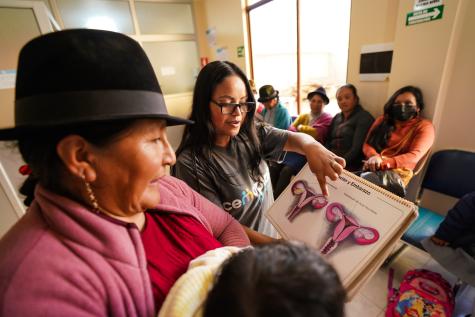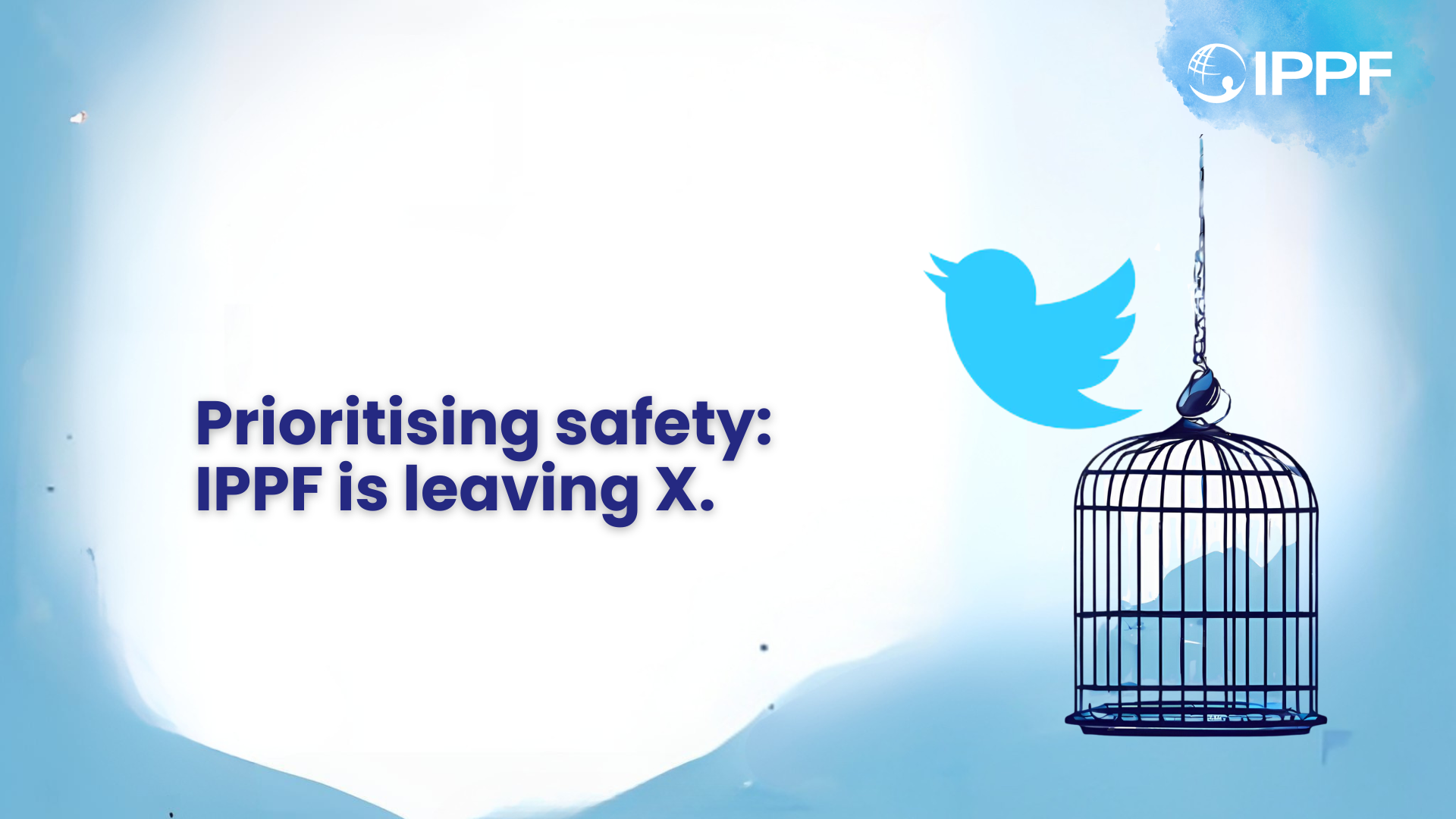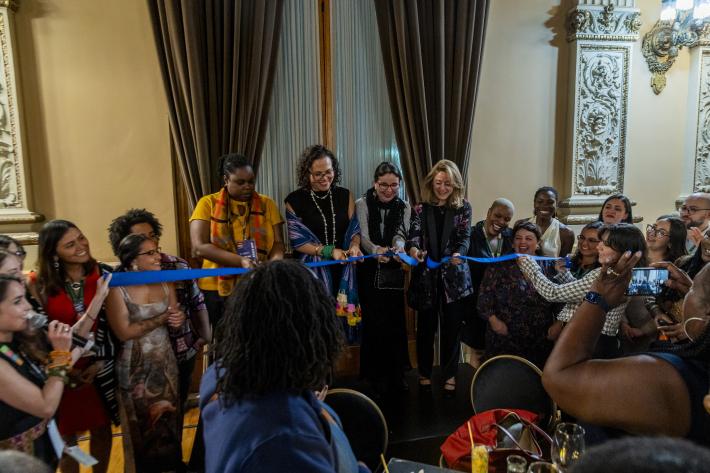
Spotlight
A selection of news from across the Federation

Americas & the Caribbean
Our Statement on the Reinstatement of the Global Gag Rule
The Global Gag Rule (GGR) violates our core principles, and IPPF cannot and will never sign it.
Filter our news by:


| 27 January 2025
Our Statement on the Reinstatement of the Global Gag Rule
On 24 January 2025, President Trump signed an executive order reinstating the Global Gag Rule (GGR). The International Planned Parenthood Federation (IPPF) - a federation of members and partners in 153 countries - fights for the right of every individual to decide about their own health, well-being and life. IPPF will never support policies which actively restrict or violate an individual’s right to bodily autonomy, including the right to safe abortion. The GGR - also known as the Mexico City Policy - violates human rights by forcing women to continue with an unwanted pregnancy or into unsafe abortion, and IPPF will not tolerate it. The GGR is a far-reaching, destructive American foreign policy, one that is deeply unpopular with the American people. It denies U.S. funding to organisations like IPPF if they use money from other donors to provide safe abortion services, counselling or referrals. It blocks critical funding for health services like contraception, maternal health, abortion care, and HIV/AIDS prevention and treatment for organisations that refuse to sign it. When it has been enacted by previous Republican Presidents, evidence has shown that the GGR has led to an increase in maternal deaths, in unplanned pregnancies and unsafe abortions. It blocks access to health care for women and the most vulnerable people, silences SRHR advocates, reduces coverage of community health workers, and infringes on a country’s sovereignty. The Global Gag Rule’s reinstatement will result in an escalation in avoidable health crises, needless physical and emotional harm, a loss of dignity for women, and death. IPPF anticipates it will lose $61 million USD for programs that provide sexual and reproductive health services for millions of women and youth. 13 countries and 16 healthcare projects worldwide are affected by the Global Gag Rule. Without funding, the people we serve will otherwise go without these vital services, including women suffering the burden of health and humanitarian crises. Donald Makwakwa, Executive Director, Family Planning Association of Malawi (FPAM): "The reinstatement of the global gag rule will have devastating consequences for women and girls in Malawi, where access to sexual and reproductive health services is already limited. Projected funding cuts to FPAM will disproportionately harm women and young girls in Malawi, many of whom rely on these services to avoid unplanned pregnancies, unsafe abortions, and maternal deaths. It is a cruel policy that sacrifices lives and bodily autonomy." The global gag is further insult to injury on top of other U.S. foreign policies that have a catastrophic impact on the communities in which our MAs work. Just yesterday, the State Department’s Office of Foreign Assistance sent a global cable that ordered an immediate pause on new foreign aid spending, as well as a stop-work order for existing grants and contracts. The new executive action targeting transgender, non-binary and intersex individuals has resulted in great fear for our communities. We have already seen funding cut as a result of its new anti-DEI executive action. The US also announced it plans to renew its membership of the Geneva Consensus Declaration, an anti-abortion joint statement initially cosponsored by persons claiming to represent the governments of Brazil, Egypt, Hungary, Indonesia, Uganda, and the United States. It was signed by persons from 34 countries on October 22, 2020. It is clear foreign aid has become a political weapon, used to enforce hateful ideologies at the expense of women in all their diversity, and against LGBTQI+, poor and immigrant communities. We cannot—and will not—deny life-saving services to the people we serve. We urge other governments and donors to step forward and call out the damage and destruction of these destructive actions. We stand in solidarity with our community. Now is the time for our movement to unite, to come together and to fight for a world of sexual and reproductive health, rights and justice for ALL. Learn more about Global Gag Rule here: The Global Gag Rule | IPPF For more information, please contact [email protected] or +44 7918 845 944.

| 17 January 2025
It's time: we're leaving X
As an organisation dedicated to promoting and protecting the health, rights, and dignity of all individuals, we must prioritise the safety and well-being of our community in every space we occupy. After careful consideration, we have decided to leave the platform X, effective 20 January 2025. Unfortunately, X no longer provides the safe and supportive environment that our community deserves. The increasing prevalence of harmful discourse and the platform's failure to adequately address it have made this decision necessary. We are also deeply concerned about Meta’s new policy updates announced in the beginning of January, which raise critical questions about privacy, misinformation, and the safety of vulnerable groups online, including women, migrants, transgender people and the LGBTQIA+ community. As advocates for sexual and reproductive health and rights, we must ensure the digital spaces we engage with uphold the values of equity, inclusion, and accountability. Our commitment to creating meaningful conversations and driving positive change remains steadfast. You can continue to connect with us on LinkedIn, Instagram, or our website, where we will remain active and responsive. To never miss an update, follow us on Instagram and tap the bell icon at the top-right corner on our profile to turn on notifications! link We thank you for your continued support and invite you to join us in advocating for safer and more equitable digital spaces for all. Together, we can build a world where everyone can thrive—online and offline. #DigitalSafety

| 18 December 2024
Confronting Hate Speech: A Call for Democratic and Inclusive Narratives
To read the original article in Spanish, in FunDheg's website, click here. On December 10 of this year, and within the framework of International Human Rights Day, which coincides in Argentina with the Day of the Restoration of Democracy, FUNDHEG held a webinar to present the report "Tongues of Fire: Flames of Hate in the Democratic Fabric," as part of the project "Democracy in Your Body," developed in collaboration with the International Planned Parenthood Federation (IPPF). The presentation, which brought together a significant national and international audience, focused on the impact of hate speech on gender policies and human rights defenders. The report also highlights setbacks and the growing threats faced by sexual and reproductive rights, as well as the strategies needed to combat these narratives and policies through democratic and inclusive approaches. A day marked by valuable testimonies The event opened with remarks by Leticia Gauna, President of FUNDHEG, and Diana Cabral, the organization’s Executive Director, who underscored the importance of building a more inclusive and equitable society in the face of global challenges. Alessandra Nilo, Director of External Relations at IPPF, provided an international perspective, emphasizing the role of global cooperation in protecting human rights. Meanwhile, Gabriela Ayala (Social Communicator) and Mariano Leiva (Journalist) presented the report, highlighting its key findings. Among the voices that enriched the event were Verónica González Bonet, a journalist from the Network of Journalists with a Gender Perspective and the Network for the Rights of People with Disabilities (REDI), and Lenny Cáceres, feminist journalist and Director of the digital newspaper Femenino in La Pampa province. Both shared valuable experiences and perspectives on the threats faced by women and people with disabilities in public and digital spaces. Manuela Calvo, a journalist from La Rioja, provided a profound analysis of the judicial persecution she faces in her province for addressing cases of violence against girls and adolescents. She emphasized the critical role of hate speech in these attacks. Through a video message, Silvina Molina, journalist and founder of the International Network of Journalists with a Gender Perspective, stressed the importance of training in the use of social media as a tool for defense against hate speech, while calling for strengthened collective and network-based work. Along similar lines, Monique Aschult, a member of Mujeres por la Igualdad, agreed with Molina and proposed strengthening alliances with regional organizations as a key strategy to confront these issues. Also present were Lidia Pérez and Diego Cazorla, former employees of the National Institute against Discrimination, Xenophobia, and Racism (INADI), recently eliminated by the current administration. They emphasized that, in this context of hate speech propagated by the State, INADI’s functions have been rendered obsolete. The event concluded with remarks by Esmeralda Alfaro, representative of the Las Crisálidas Association in Guatemala, who reaffirmed the importance of regional sorority and solidarity in defending human rights. Reaffirming Commitments The webinar was widely praised for its content and the quality of the reflections shared. The testimonies and analyses presented not only identified current challenges but also proposed transformative strategies based on new democratic narratives. FUNDHEG and IPPF reaffirmed their commitment to continue working toward an inclusive, equal, and respectful society, especially during this critical moment for human rights in Argentina and the region. This event solidified itself as an essential space for dialogue, aiming to build democratic and equitable tools to confront the flames of hate.

| 17 December 2024
Empowering Young Digital Advocates to Transform Narratives
The IPPF ACRO Youth Network has successfully concluded the “Rays” class of Creadoras Camp, a virtual content creation bootcamp that empowered young leaders across Latin America and the Caribbean with the skills and knowledge to transform their digital activism. Developed in collaboration with Volcánicas, a Latin American feminist media outlet, and Fundación Hoja Blanca ONG, this camp equipped participants to craft impactful, rights-affirming social media content that counters anti-rights narratives with inspiring, inclusive messages. Over the past two months, 31 participants from Antigua & Barbuda, Bolivia, Colombia, Ecuador, Guatemala, Guyana, Honduras, Jamaica, Mexico, Paraguay, and Peru engaged in dynamic workshops led by expert content creators and activists. Through sessions on podcast production, visual storytelling, and digital communication strategies, they explored key concepts of online advocacy and honed their ability to design, record, and produce high-quality digital content tailored to youth audiences. The participants’ growth was remarkable, as they not only developed technical skills but also deepened their understanding of using digital platforms to advance reproductive justice and progressive social change. This program exemplified the power of collective learning, providing young advocates with the confidence and tools to amplify their voices in meaningful ways. Following the camp, 15 standout participants will be selected for an advanced mentorship program in podcast production. This series will spotlight youth perspectives across the region, sharing experiences and insights to challenge prejudice and drive narrative change around reproductive rights and social justice. The Rays class of Creadoras Camp stands as a testament to the transformative power of youth-led initiatives. By investing in this innovative training, IPPF ACRO has reaffirmed its commitment to fostering inclusive activism and enabling the next generation of changemakers to shape a future rooted in equity, feminism, and reproductive rights.

| 25 November 2024
What Kind of Man Are You?
A question: #WhatKindOfManAreYou? Violence is not strength, silence is not a solution. Gender-based violence impacts countless lives every day, leaving a trail of pain and injustice. But in IPPF ACRO, we believe in change, and it starts with talking about it. It’s time to break the cycle. To stand up, speak out, and redefine what it means to be a man. Join us in questioning harmful norms. Men and boys can be partners in building respect, equality, and safety for all.Men and boys, in all their diversity can contribute to eliminating gender based violence. Let’s talk about it. Want to join us? Click here to access the campaign toolkit.

| 05 November 2024
IPPF ACRO Youth Network Kicks Off “Creadoras Camp” for young leaders!
The IPPF ACRO Youth Network has officially launched the “Rays” class of “Creadoras Camp,” a virtual content creation camp designed to equip young leaders across Latin America and the Caribbean with the conceptual and practical tools they need to elevate their digital activism. Creadoras Camp, an original methodology created by Volcánicas, a latinamerican feminist media outlet, and Fundación Hoja Blanca ONG, offers participants the skills to create impactful social media content that defends sexual and reproductive rights, countering anti-rights narratives with inspiring, inclusive messages. The Rays Class is an IPPF ACRO Youth-Network Exclusive, as it reflects the demands of the youth network for dedicated training to amplify their voices and engage others in championing progressive social change. From October to November 2024, participants will join dynamic virtual workshops led by expert content creators and activists. Guided by specialized facilitators, they’ll dive into podcast production, visual content creation, and digital communication strategies, alongside key concepts for online advocacy. Through these sessions, participants will learn to design, record, and produce high-quality digital content, equipping them to effectively communicate messages that resonate with diverse youth audiences. Creadoras Camp will welcome 31 young participants affiliated with IPPF ACRO’s membership and partners from Antigua & Barbuda, Bolivia, Colombia, Ecuador, Guatemala, Guyana, Honduras, Jamaica, México, Paraguay, and Perú. Following this first stage, the 15 most promising profiles will be selected for a mentorship program in podcast production. This podcast series will give voice to the region's youth as they share insights and experiences around reproductive justice and progressive social advocacy. This project is a vital platform for narrative change, enabling youth voices to challenge prejudice and promote a more inclusive discourse in the region. Supported by IPPF ACRO and partnerships with initiatives like Volcánicas, the Rays class of Creadoras Camp is a unique opportunity for young creators to deepen their impact and contribute meaningfully to advancing feminism and reproductive rights.
















